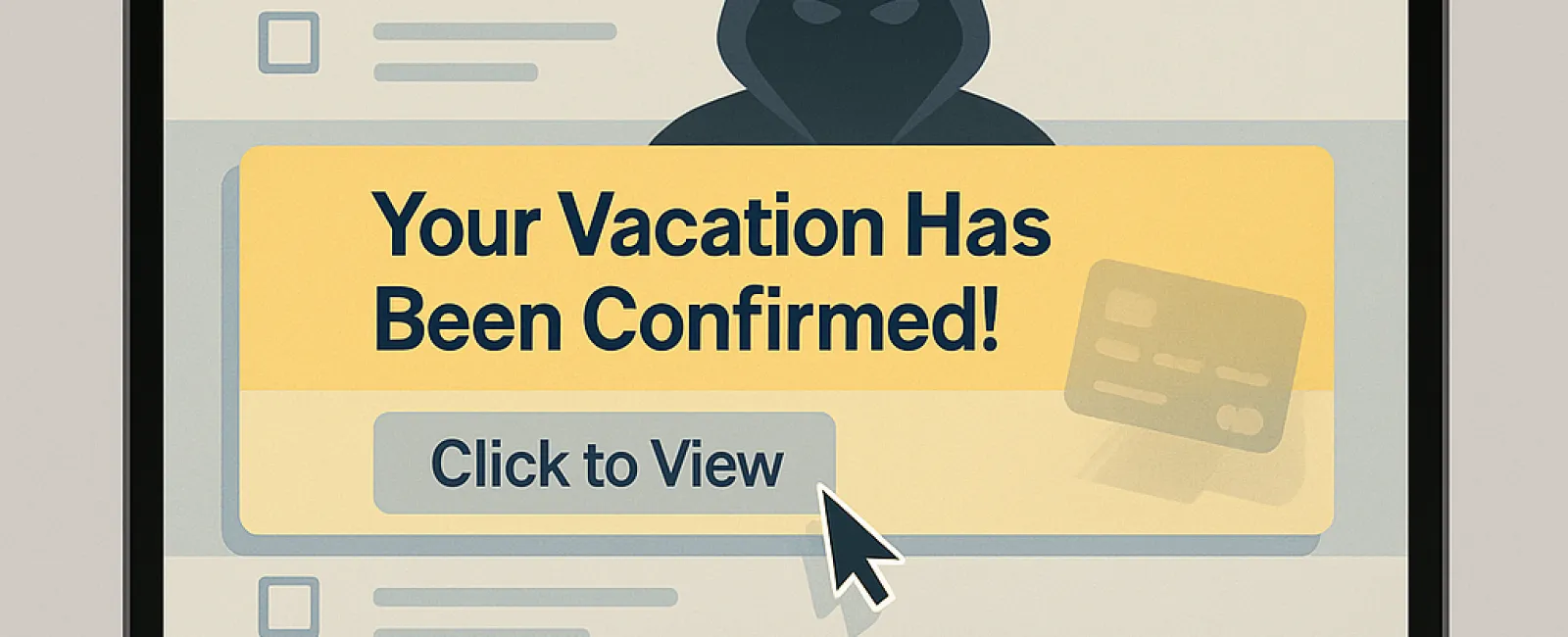May 12, 2025
Planning your next vacation? Before clicking on any booking confirmation email, make sure it's authentic!
The summer travel rush is here, and cybercriminals are capitalizing on this season by sending out convincing fake booking confirmations that mimic airlines, hotels, and travel agencies. These dangerous scams aim to steal your personal data, hack your online accounts, and infect your devices with malware.
Even experienced travelers are being tricked.
How This Scam Works
A Fraudulent Booking Email Arrives In Your Inbox
● The email may appear to be from reputable travel brands like Expedia, Delta, or Marriott.
●Scammers use authentic logos, proper layouts, and even fake customer support numbers to increase credibility.
●The subject lines create urgency:
○ "Your Miami Trip Is Confirmed! Click Here For Details"
○ "Flight Itinerary Updated - Click To Review"
○ "Immediate Action Needed: Confirm Your Hotel Stay"
○ "Complete Your Car Rental Reservation Now"
Clicking The Link Redirects You To A Fake Website
● The email urges you to "log in" to verify details, update payment info, or download itineraries.
● The link directs you to a convincing but counterfeit website designed to capture your login details.
Hackers Then Steal Your Information Or Money
● Once credentials are entered, criminals gain access to your airline, hotel, or financial accounts.
● Providing payment information can lead to stolen credit card data or fraudulent charges.
● If malware is embedded, your device and all stored information could be compromised.
Why This Scam Is So Persuasive
- It Looks Authentic: These phishing emails are meticulously crafted—with logos, designs, and familiar-looking links—to imitate real confirmations.
- It Creates Urgency: Alerting you about "reservation issues" or "flight changes" induces panic, prompting rushed actions.
- People Are Distracted: Whether busy with work or excited about travel plans, many fail to verify the emails thoroughly.
- Risks Extend Beyond Personal: This threat also jeopardizes businesses.
If you or your team frequently travels for work, the danger escalates. One person often manages all company travel bookings—flights, hotels, cars, and conferences.
With numerous confirmation emails, a fake one can easily go unnoticed. A single click from anyone managing corporate travel could:
● Put your company credit cards at risk.
● Give hackers access to critical corporate travel accounts.
● Infect your company's network with malware if malicious attachments are included.
Steps To Safeguard Yourself And Your Business
- Always Verify Before Clicking: Access airline or hotel sites by typing their URLs directly—avoid using email links.
- Scrutinize The Sender's Email: Scammers often use email addresses similar but slightly different (e.g., "@deltacom.com" instead of "@delta.com").
- Educate Your Team: Train employees, especially those managing travel bookings, to detect phishing attempts.
- Implement Multifactor Authentication (MFA): This extra security step keeps accounts safer even if credentials are stolen.
- Strengthen Business Email Security: Deploy measures to block malicious links and phishing attachments.
Don't Let A Fake Travel Email Harm Your Business
Cybercriminals time their attacks perfectly, and travel season is the ideal window.
If you or your team members book business travel, manage reservations, or handle expenses, you face a high risk.
Let's ensure your business stays secure.
Begin with a FREE Discovery Call. We will evaluate your vulnerabilities, fortify your defenses, and protect your team against phishing scams like these.
Click here or call us at (802) 331-1900 to schedule your complimentary Discovery Call today!





